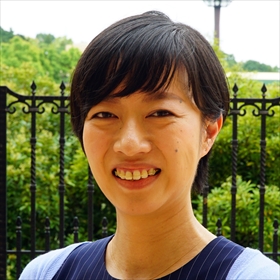The second global career course lecture of this year was held with more than 200 students participating. It was held at a slightly different venue with a bigger screen to show the associated images..

This time, we welcomed Ayako Kobayashi a researcher for Cabinet Office for International Peace Cooperation (PKO Secretariat), as the lecturer. She learned about international relations in the university and has experience working in United Nations agencies.
She talked about working in South Sudan and what she learned there with a presentation titled “What I thought in about the role of cross-cultural understandings and diplomacy while in Sudan”.


First, she explained about cross-cultural understanding using photos. She introduced an overview of South Sudan covering things such as places there and its history. After, she showed the differences between Japan and South Sudan.
“In South Sudan, there is a tribe whicha has the tallest average height in the world. The average height is 190cm.”

“Also, cattle have an equivalent value with money, so when you get married, there is a custom of men giving a cow to the woman’s family.”

“Possibly due to the civil war in the country, there is a feeling of caring deeply for close family members. They have a strong “sense of family””.

She introduced what cross-culture understanding is from various angles, such as using photos, telling stories of her own experiences with the local people, and introducing their concept of a sense of family using an “Identity Circle”, which is a method to understand the perceptions of others.

The students were paying close attention to the talk and the concept of cross culture which they did not know about until then. They expressed their surprise vocally, laughed, and also listened seriously to the problems.

South Sudan has a big difference in culture from Japan. Ms. Kobayashi referred to the facts that working there and doing diplomatic work was such a hard job.

She told the students that what she was troubled by the most at work was the difference in the sense of time between Japanese people and South Sudanese people.
In Japan, people are very punctual so they often told to “Get your work done quickly.” However, when she expected that in the work of South Sudanese people, she was told “There is still plenty of time. Working quickly is not really our way”. She was not able to reach a good compromise at first.

Ms. Kobayashi, however, accepted the differences, and continued to work tenaciously.
“I made Japanese side who are usually in a hurry, try to understand what South Sudanese tend to do. On the other hand, I continued to meet South Sudanese people every day and tried to persuade them to understand our style. As a result, they finally warmed up to me.”

Through building bridges between the two sides patiently and continuing try to persuade both to understand the other side, she was able to work successfully as a diplomat between the representatives of two different countries.

One thing that Ms. Kobayashi learned from this experience was that diplomacy is a “bridge”. It was “making people from different cultures understand each other so things proceed well”.
“I want to be a bridge between South Sudan and Japan”. Her words had a determination.

“You might have an image of diplomacy where it takes place at a big conference, but, you will also work in the field. If you are interested in an international career, please jump into fieldwork.” Her messages were delivered gently and had a level of persuasiveness due to her working in field, and also gave a strong push to the students to pursue their future goals.

The students who received those messages asked many questions; “I want to work in Africa in the future. What should I learn? “, “What is the food culture of Southern Sudan like?”, “How about the medical environment?”


This lecture helped students to understand the real power of diplomacy- building a “bridge” at the local level. They increased their will to understand cross-cultural relationships more and to work in the field as a future career goal.




